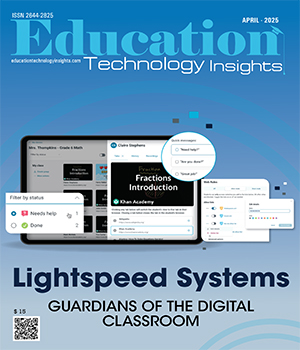THANK YOU FOR SUBSCRIBING
Be first to read the latest tech news, Industry Leader's Insights, and CIO interviews of medium and large enterprises exclusively from Education Technology Insights
Collaborative Science: Breaking Barriers for Societal Progress
Noel Gardner, Director of STEM and Health Sciences Program, Jackson State University
 Noel Gardner, Director of STEM and Health Sciences Program, Jackson State University
Noel Gardner, Director of STEM and Health Sciences Program, Jackson State UniversityI have had the opportunity to work in the field of Science, Technology, Engineering and Mathematics for 10 years. It has been a rollercoaster ride of knowledge, pain, laughter, and moments of pure gratitude. The knowledge that I have gained has been invaluable within the past decade. One important part of my journey has been understanding how to guide students to their fullest potential in research, social development amongst the sciences and social development within their community. As a computational chemist, by trade, I understand the need and importance of students performing research as early as possible within their matriculation. I consistently guide students through the thought processes and understanding that is needed to be a good scientist, which include technique, an open mind, flexibility, communication and good collaboration.
Research has changed drastically within the last decade. Research at institutions of higher learning are now hubs for economic development. Higher education and colleges are discovering solutions to diverse needs within various communities. Leveraging the challenges that society faces each day can be managed by intersecting with multiple sectors (industry and academia). Universities house talent in many areas that can answer the questions that change consistently. It is important to tear down the walls of the silos that may have been erected over the last few years (possibly due to Covid) and work with colleagues to find the answers that society needs the most. A multi-tier team is crucial for inter-institutional connectivity. This thought goes beyond partnerships with agencies/other departments - it is centered on relationships. Building a collaborative team across universities could fit the bigger vision of meeting the needs of states within the nation and beyond. Scientists and students (future scientists) are the answer to the problems we have today and the problems we will have in the future. Finding faculty/scientists that are willing to train the future scientists is what is needed -this desire cannot be taught.
“Challenges or barriers present themselves daily, but the new patent, invention, or research that is blossoming out-weighs all challenges or barriers.”
There are barriers to overcome- funding, finding partnerships/collaborations, politics, administration, funding, funding and more funding. We must find a way to move past the inhibitions of the barriers. How? Focus on the science. There will always be barriers, but this does not negate the need for good science, good scientists and life changing results. Considering the impact upon the next generation aside from the barriers we may face and possible answers to the next challenge that we, as a society, may face may help to get over the hurdles of those overarching barriers.
Within the next 10 years, I hope to see the changes that we need instead of changes that are futile. Having an understanding that research at different institutions of higher learning has evolved into social and economic development is paramount. I can extrapolate that there will be more needs, more challenges, more barriers, nevertheless, we must overcome these hurdles with the desire and love for science, technology, engineering and mathematics. To scientists, future scientists and all who are in between, whatever your area of interest in STEM, find your niche and run with it. Challenges or barriers present themselves daily, but the new patent, invention, or research that is blossoming out-weighs all challenges or barriers.
Weekly Brief
Featured Vendor
Read Also
Building Future Leaders with Faith and Integrity
Virtualization as a Bridge For Multi-Campus Support
Building Practical Readiness in Cybersecurity Talent
The Liberal Arts to the Rescue
Faith Based Counseling Supporting Holistic Student Growth
Will ChatGPT End Higher Ed? Not So Fast

I agree We use cookies on this website to enhance your user experience. By clicking any link on this page you are giving your consent for us to set cookies. More info

























